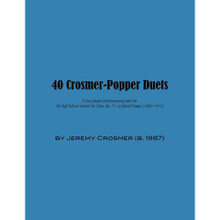 Loading... Please wait...
Loading... Please wait...|
|
Crosmer: 40 Crosmer-Popper DuetsPrice:
$22.50
SKU:
3306 057
Brand:
Availability:
available
Shipping:
Calculated at checkout
|
Product Description
David Poppers 40 High School Etudes for cello, much like Paganinis 24 Caprices for violin, are at the center of study to develop advanced technical proficiency. Gifted young cellist Jeremy Crosmer has created 40 new etudes, designed to be played alongside Poppers original etudes. These etudes can be played alone, for careful study. But when played alongside Poppers original etudes, they become cello duets of the highest order, opening a completely new musical dimension, suitable for study as well as for recital.
For cellists at the college level, the core module for practicing technical proficiency comes from the 40 High School Etudes by David Popper, much like Niccol Paganini's 24 Caprices for violin. Over the course of the past century, these etudes have been relied upon more and more for mastery of the instrument, and today it is not uncommon for students to be expected to know all forty by the time they graduate from college. As a living testament to this fact, I finished learning the etudes during my first semester as a graduate student.
I composed forty etudes in the style of Popper, each one meant to be played simultaneously by a second cellist along with the Popper etudes. Entitled the Crosmer-Popper Duets, the second cello part is of the same difficulty as the original etudes and emphasizes similar technical aspects while covering more ground. By performing these etudes as duets with the original Popper etudes, students must not only focus on combining technique with musicality, but must also learn to adjust to the dynamic of a second player. The purpose of this second set of etudes is to widen students' perception of technique to include ideas such as phrasing, listening, blending sound, feeling pulse and matching stroke and articulation with another player. Each of these concepts must be given due attention while the player is simultaneously combating the difficulty of his or her own part. By having students learn these etudes and then perform them together, cello professors can encourage students toward technical proficiency while avoiding the pitfall of robotic performance. I would like to encourage cellists not only to learn these new etudes for their technical advantage, but also to perform them in order to gain the most from this book.
- Jeremy Crosmer


